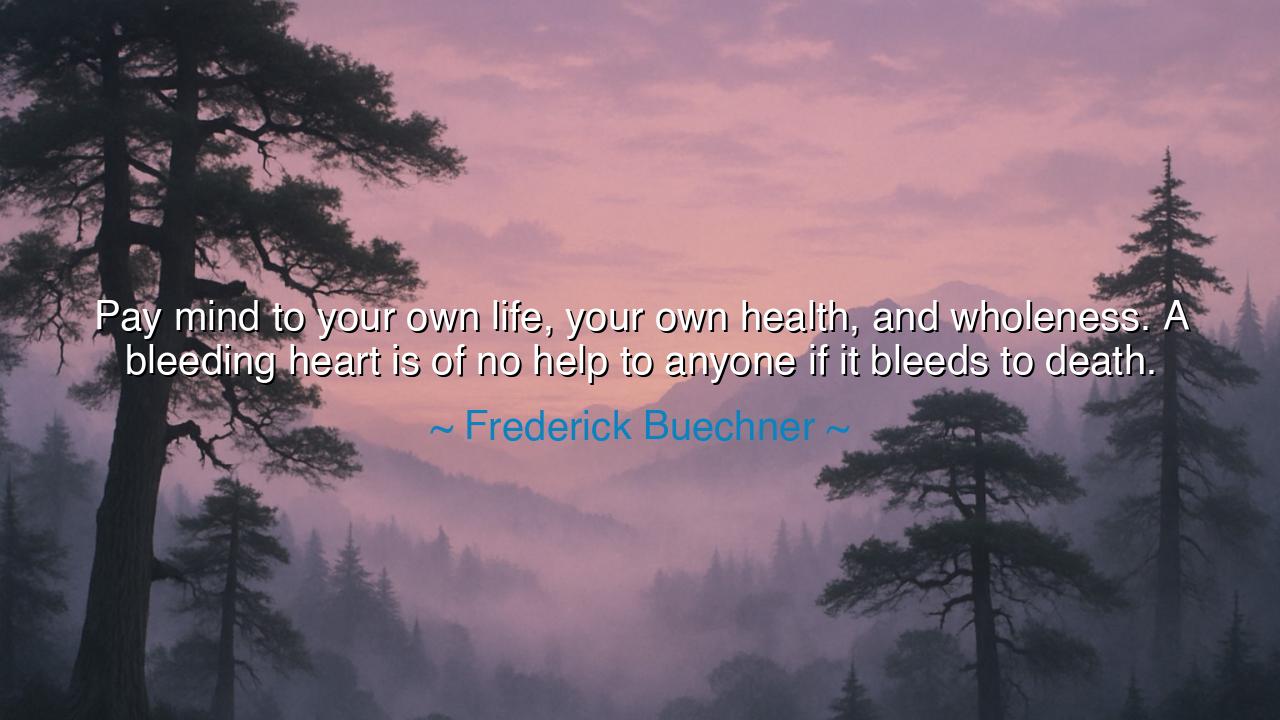
Pay mind to your own life, your own health, and wholeness. A
Pay mind to your own life, your own health, and wholeness. A bleeding heart is of no help to anyone if it bleeds to death.






The American theologian and storyteller Frederick Buechner once wrote: “Pay mind to your own life, your own health, and wholeness. A bleeding heart is of no help to anyone if it bleeds to death.” These words, gentle yet piercing, call upon the soul to find balance between compassion and self-preservation. Buechner, who spent his life exploring the depths of faith, pain, and grace, understood that love — to remain true — must be sustained by strength. His teaching is not a denial of mercy, but a reminder that no heart can heal others if it neglects its own wounds.
To “pay mind to your own life” is to honor the sacredness of your own being. In every age, the noble-hearted have been tempted to give themselves away completely — to pour all their energy, time, and love into others, forgetting that they, too, are vessels that must be filled. Buechner’s wisdom reminds us that compassion must be rooted in wholeness, not exhaustion. Just as a lamp cannot shine once its oil is gone, a soul cannot serve when it is broken beyond repair. To care for oneself is not selfishness — it is the foundation of enduring love.
Throughout history, the wisest souls have known this truth. Consider the life of Florence Nightingale, the “Lady with the Lamp.” During the Crimean War, she worked tirelessly to save the wounded, but nearly collapsed from illness and fatigue. When she recovered, she learned that service without rest becomes destruction — that to heal others, one must first preserve one’s own strength. She reorganized her work, building systems that sustained both her nurses and their patients. Like Buechner, she discovered that a heart that bleeds endlessly will soon bleed out — and that true compassion must flow from health, not martyrdom.
In Buechner’s time, this teaching came as a response to the quiet despair of modern life. He saw countless people — pastors, parents, helpers — who gave until they were empty, mistaking depletion for devotion. His words echo an ancient rhythm: the balance between self-care and self-giving. The ancients understood this harmony well. Even the monks and mystics who lived in silence did so not to escape the world, but to renew their spirits so they could return to it with clearer eyes. The soul, like the body, needs breath — a rhythm of giving and receiving, of pouring out and being filled again.
The “bleeding heart” in Buechner’s metaphor represents compassion unchecked — love without boundary, empathy without rest. While such love is noble, it becomes tragedy when it leads to self-destruction. A heart that gives endlessly without healing eventually loses its pulse. True service requires wisdom as much as warmth, for even the most generous spirit must guard its flame from being consumed by the winds of suffering. Compassion that does not include the self is incomplete; it cannot last.
The lesson, then, is both simple and profound: nurture yourself as you would nurture another. Do not neglect your own body, your own mind, or your own peace in the pursuit of helping others. Remember that your strength, your calm, and your health are gifts you bring into the world — and without them, your goodness fades into weariness. Love others deeply, but love yourself wisely, for the heart that beats with balance gives more than the one that bleeds without end.
And so, let Frederick Buechner’s wisdom endure as a quiet commandment: “Pay mind to your own life, your own health, and wholeness.” Tend to the garden of your soul so that your compassion may bloom again and again. Rest when you are weary, seek joy when you are heavy, and mend your heart when it breaks. For in keeping yourself whole, you become a wellspring — one whose love does not fade, but flows eternally, strong enough to nourish both yourself and the world.






AAdministratorAdministrator
Welcome, honored guests. Please leave a comment, we will respond soon